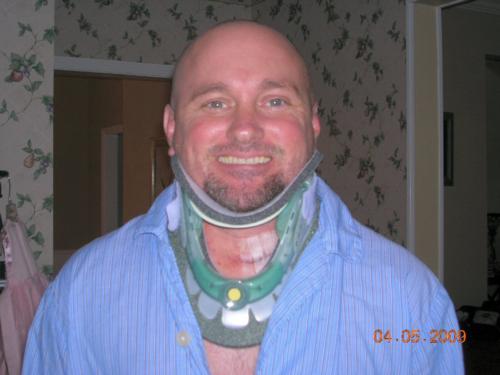
I recently had some surgery on my neck. I was diagnosed with "degenerative disc disease" and 4 layers of my neck (C4-T1) had collasped on themselves cutting off the majority of the flow of impulses, etc to my left arm. (I’m not a Dr and don’t know all the technical jargon, so these are my words not the Docs) The last three fingers of my left hand stopped working back in January and my left arm muscles had atrophied over the course of the couple months they were trying to treat me. After all the other treatments had failed and I was told that surgery was the only thing that was going to get me back in shape. They were going to fuse 4 layers of my neck; C4-C5, C5-C6, C6-C7 and C7-T1 using titanium plates, screws and cadaver bones. The opration itself is widely used, but I had, personally, never run across anyone that had that many layers done in the neck before.
Since I couldn’t find any personal expereince to draw from, I decided to send an email to DAN asking about diving post-op.. I told them what was happening and asked what I could excpet in post-op life. Now, I knew there were variables as to how my body reacted and how it healed that would be specific to me, so I was just asking for a "ballpark" generic answer from them. This is what they sent me as a reply:
Hello Dale,
Thank you for your inquiry and support of Divers Alert Network through your membership. I am sorry for the delayed response! General spinal surgery is a concern to diving medicine physicians, but it does not automatically disqualify candidates from diving. There is no evidence that surgery would predispose a diver to spinal cord decompression sickness, but there is concern about the disruption of blood supply to the area where the surgery was performed.
The formation of scar tissue and altered blood flow may not allow for the most effective offgassing of nitrogen from surrounding tissue once it is absorbed during the dive. Actually, it is the physical limitations after surgery which may be a more important consideration. A diver with a history of back surgery is exposed to the possibility of a second back injury in two ways: by lifting and carrying dive equipment or by simply moving about with full equipment on board the dive vessel.
Once a diver returns to full activity after surgery and has no residual symptoms such as numbness, tingling, pain or burning sensations in the legs, the back problem is probably corrected. The diver can return to scuba diving as long as symptoms don’t recur with exercise or other activities. Extra precautions after back surgery include: donning equipment after entering the water; limiting dive depths and times; increasing the length of surface intervals; and reducing diving frequency. Limiting exposure to high partial pressures of nitrogen is the best way to avoid decompression illness.
Ultimately your physician will be the one who needs to clear you for diving post surgery. If this is a topic he is not very familiar with you can always have him call information hotline number (919)684-2948 and they could speak to one of the medics here at DAN. I hope this is helpful and thank you for supporting Divers Alert Network and diving safety. If you have any other questions please do not hesitate to ask.
So, after getting such a good response from DAN, I wanted to pass it along to all my DiveBuddys in case they had a similar situation. And, just to show everyone, if you have a question, please feel free to calll DAN and ask. They are are there to help divers.. Call ’em or email ’em they are there for us..
On a personal note, the surgery was completed on 3 April and I’m in recurpeation mode right now at home. The Doc says it could take up to 6 months to get the feeling back in my fingers and up to 2 years for them to start working at 100% again of the fine motor skills I had back in December. It’s a long time, but at least I know I will get better and not worse. I don’t need 100% of my fine motor skills (or feeling for that matter) to dive... But, it sure makes playing Guitar Hero impossible. :)
D